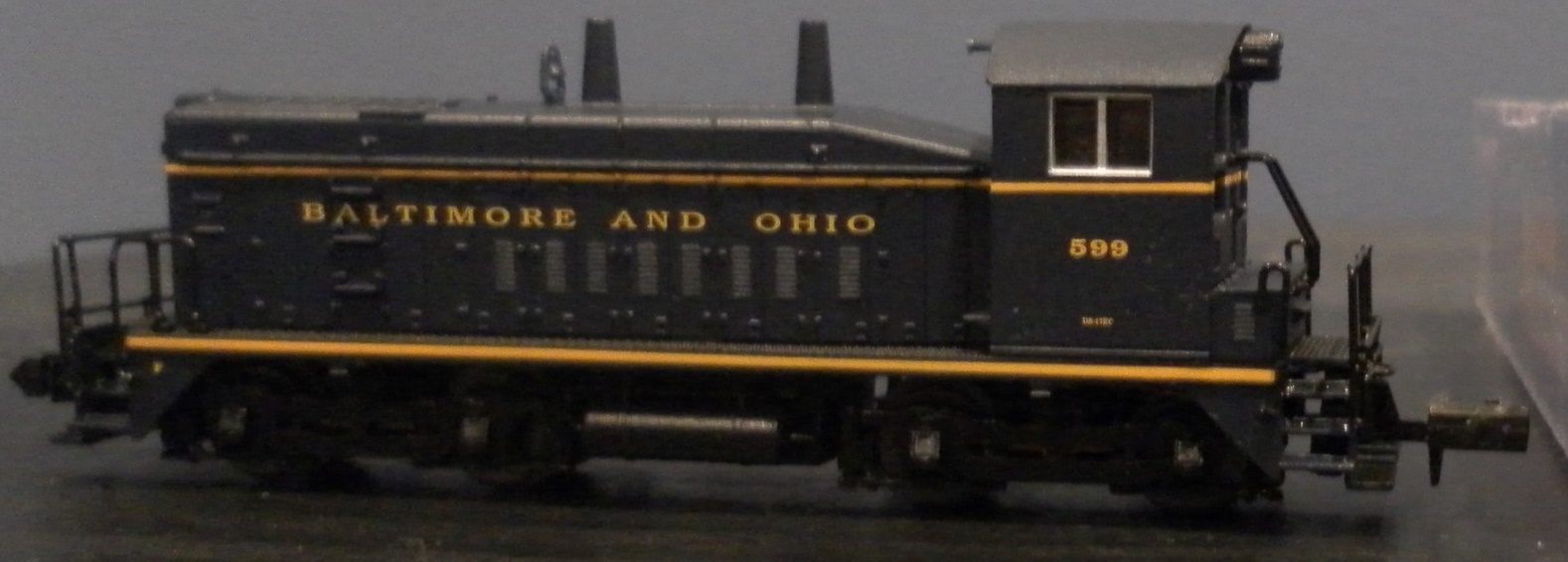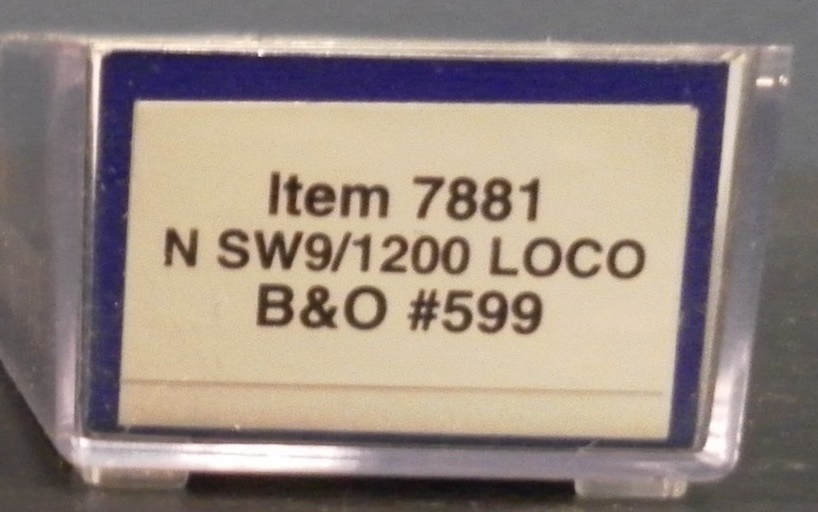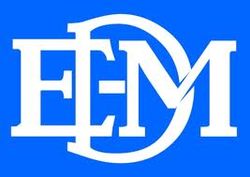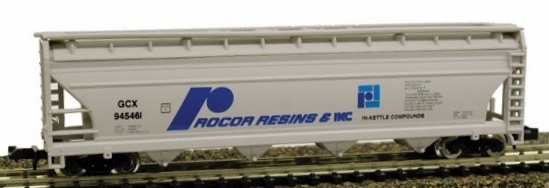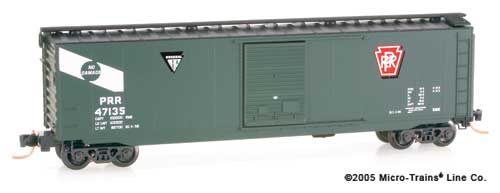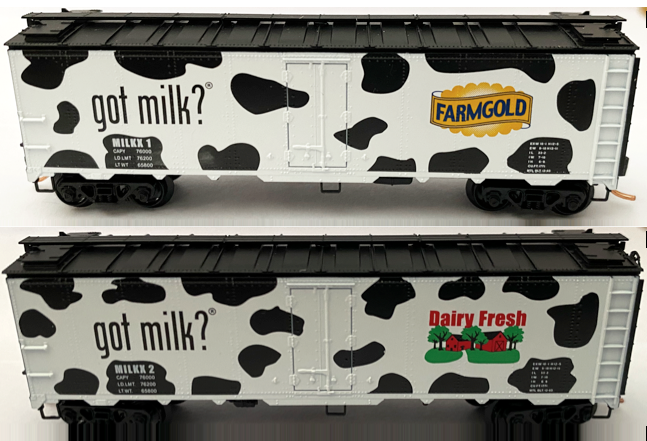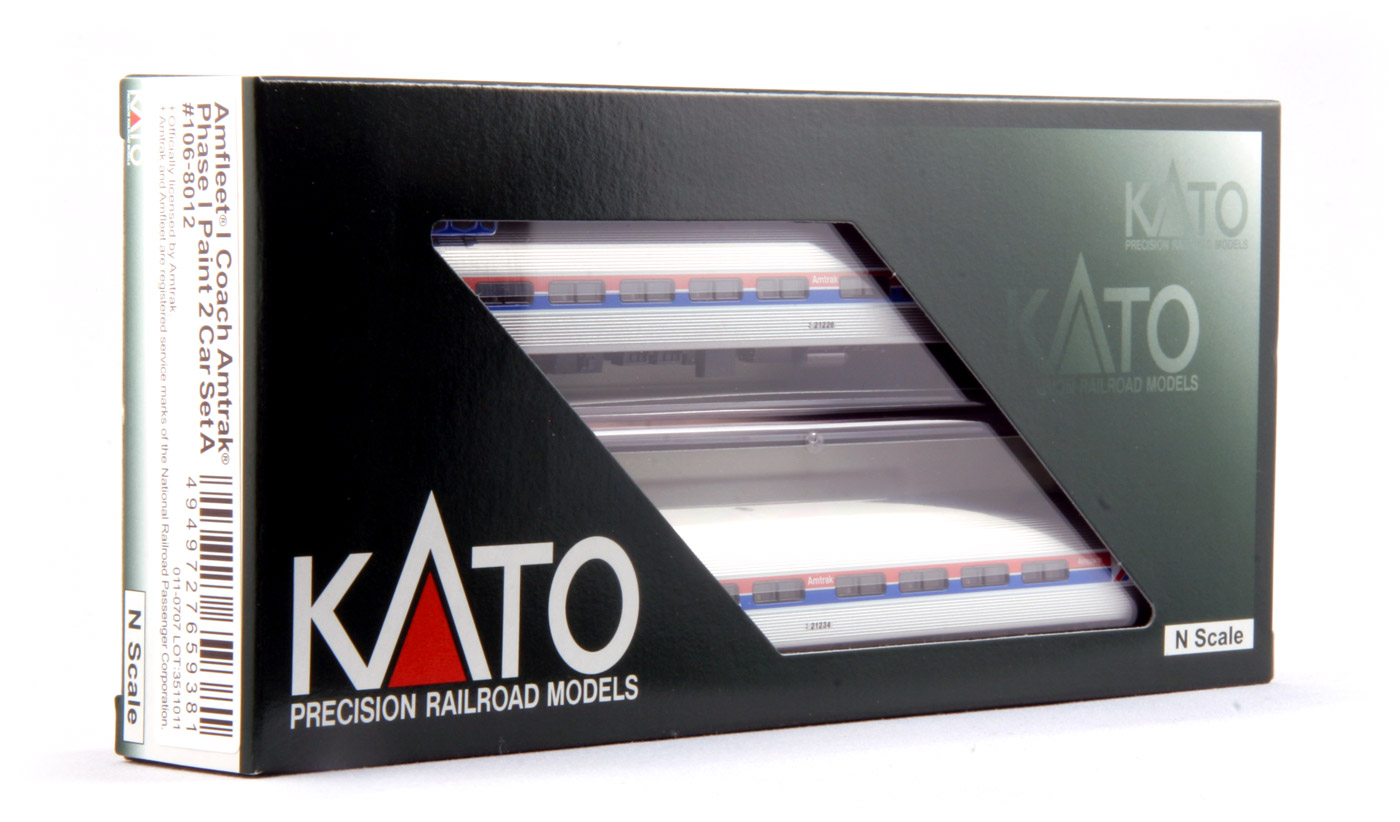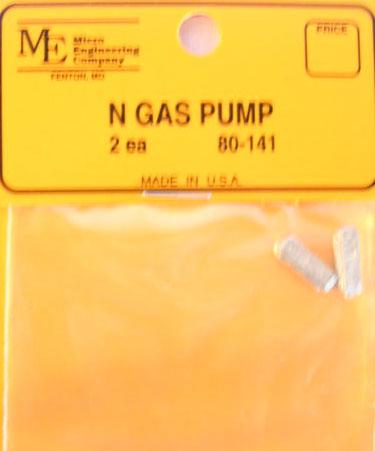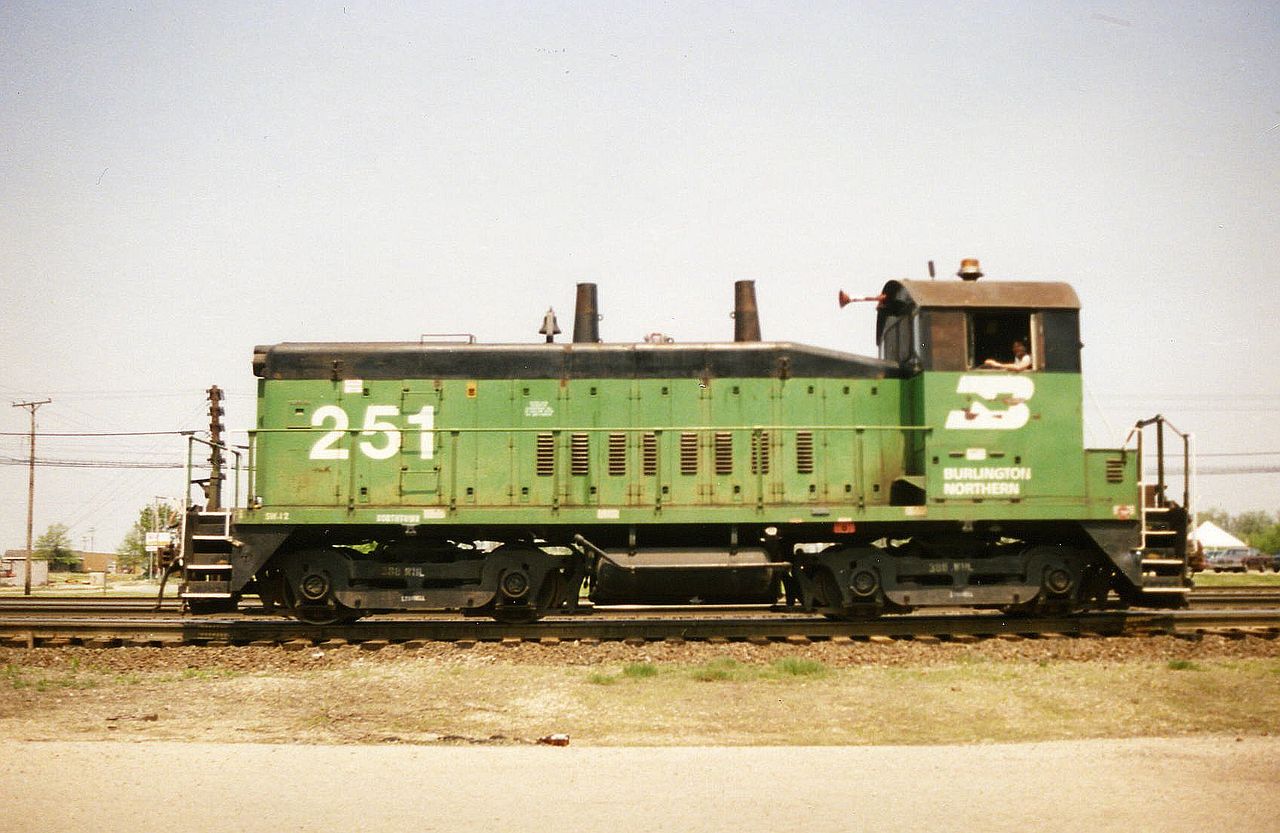Model Information: Life-Like introduced the SW9/1200 model in 1997. In 2003, they added the SW8/600/900 which is a very similar model which uses the same mechanism. It is fairly high quality and runs well when it can get good pickup. It is prone to stalling, however, whenever it has slightly dirty wheels, encounters slightly dirty track or runs over a turnout. For this reason, they are best run in pairs or at high speeds.
For the older models, the reason for the stalling is due to the fact that it is simply a small, lightweight engine. Even though the chassis is all-metal and split-frame with a free-floating weight inside the cab, it just doesn't weigh all that much. Without enough heft, it is hard to keep conductivity with the track. The motor is s 5-pole skew-wound job. All eight wheels provide pickup and drive. Directional lighting is provided by an LED-equipped PC board mounted to the front of the chassis. The model uses chemically blackened wheels. Early runs used body-mounted Rapido couplers. Later versions feature Accumate or MTL couplers. The couplers are held in place with a plastic clip to permit easy swapping with the couplers of your choice.
In 2017, in cooperation with Micro-Trains, this mechanism was overhauled to create a smoother running, fully DCC-Ready version. Walthers supplies the mechanisms for the latest 2017 DCC-Ready version to Micro-Trains which uses its own shell for their switchers.
For the older models, the reason for the stalling is due to the fact that it is simply a small, lightweight engine. Even though the chassis is all-metal and split-frame with a free-floating weight inside the cab, it just doesn't weigh all that much. Without enough heft, it is hard to keep conductivity with the track. The motor is s 5-pole skew-wound job. All eight wheels provide pickup and drive. Directional lighting is provided by an LED-equipped PC board mounted to the front of the chassis. The model uses chemically blackened wheels. Early runs used body-mounted Rapido couplers. Later versions feature Accumate or MTL couplers. The couplers are held in place with a plastic clip to permit easy swapping with the couplers of your choice.
In 2017, in cooperation with Micro-Trains, this mechanism was overhauled to create a smoother running, fully DCC-Ready version. Walthers supplies the mechanisms for the latest 2017 DCC-Ready version to Micro-Trains which uses its own shell for their switchers.
DCC Information: For the older versions of this model, there is no specific support for DCC on these models, but installing a decoder in the cab is a usual solution.
A wired DCC decoder installation for this model can be found on the following:
Brad Myers' N-scale DCC decoder installs blog. André Kritzinger's Chessie System in N scale website.
For the newer versions of this model (2018+), the mechanism supports drop-in decoders. TCS Both the TX MT1500 or Digitrax DN-126M2 decoders will work.
For the newer versions of this model (2018+), the mechanism supports drop-in decoders. TCS Both the TX MT1500 or Digitrax DN-126M2 decoders will work.
Prototype History: An EMD SW1200 is a diesel switcher locomotive built by General Motors Electro-Motive Division between January 1954 and May 1966. Power was provided by an EMD 567C 12-cylinder engine which generated 1,200 hp (895 kW). Late SW1200s built in 1966 were built with the 567E 12-cylinder engine. Additional SW1200 production was completed by General Motors Diesel in Ontario Canada between September 1955 and June 1964.
737 examples of this locomotive model were built for American railroads, 287 were built for Canadian railroads 4 were built for Brazilian Railroads, 25 were built for a Chilean Industrial firm, and 3 were built for the Panama Canal Railway. A cow-calf variation, the TR12, was cataloged, but none were built. A few units were built with dynamic brakes, featuring large square box with a fan on top of the hood, right in front of the cab.
An SW1200RS is a variation of the standard SW1200 that featured large front and rear (on some units) numberboard housings, EMD Flexicoil B-B trucks, and larger fuel tanks for roadswitcher service. The majority of the Canadian National and Canadian Pacific SW1200 fleets were purchased as SW1200RS units. The Sandersville Railroad Company EMD SW1200 road number SAN 1200 formerly SAN 200 was originally built with the V-12 EMD 567C Prime Mover but it was replaced with a V-12 EMD 645 Prime Mover, the two both produce 1,200 Horsepower, even though the same motor in the EMD SW1500 produces 1,500 Horsepower. The SAN 1200 also has EMD Flexcoil trucks instead of the standard switcher trucks found on other EMD SW1200s.
From Wikipedia
737 examples of this locomotive model were built for American railroads, 287 were built for Canadian railroads 4 were built for Brazilian Railroads, 25 were built for a Chilean Industrial firm, and 3 were built for the Panama Canal Railway. A cow-calf variation, the TR12, was cataloged, but none were built. A few units were built with dynamic brakes, featuring large square box with a fan on top of the hood, right in front of the cab.
An SW1200RS is a variation of the standard SW1200 that featured large front and rear (on some units) numberboard housings, EMD Flexicoil B-B trucks, and larger fuel tanks for roadswitcher service. The majority of the Canadian National and Canadian Pacific SW1200 fleets were purchased as SW1200RS units. The Sandersville Railroad Company EMD SW1200 road number SAN 1200 formerly SAN 200 was originally built with the V-12 EMD 567C Prime Mover but it was replaced with a V-12 EMD 645 Prime Mover, the two both produce 1,200 Horsepower, even though the same motor in the EMD SW1500 produces 1,500 Horsepower. The SAN 1200 also has EMD Flexcoil trucks instead of the standard switcher trucks found on other EMD SW1200s.
From Wikipedia
Road Name History: The Baltimore and Ohio Railroad (reporting marks B&O, BO) is one of the oldest railroads in the United States and the first common carrier railroad. It came into being mostly because the city of Baltimore wanted to compete with the newly constructed Erie Canal (which served New York City) and another canal being proposed by Pennsylvania, which would have connected Philadelphia and Pittsburgh. At first this railroad was located entirely in the state of Maryland with an original line from the port of Baltimore west to Sandy Hook. At this point to continue westward, it had to cross into Virginia (now West Virginia) over the Potomac River, adjacent to the confluence of the Potomac and Shenandoah rivers. From there it passed through Virginia from Harpers Ferry to a point just west of the junction of Patterson Creek and the North Branch Potomac River where it crossed back into Maryland to reach Cumberland. From there it was extended to the Ohio River at Wheeling and a few years later also to Parkersburg, West Virginia.
It is now part of the CSX Transportation (CSX) network, and includes the oldest operational railroad bridge in the USA. The B&O also included the Leiper Railroad, the first permanent horse-drawn railroad in the U.S. In later years, B&O advertising carried the motto: "Linking 13 Great States with the Nation." Part of the B&O Railroad's immortality has come from being one of the four featured railroads on the U.S. version of the board game Monopoly, but it is the only railroad on the board which did not serve Atlantic City, New Jersey, directly.
When CSX established the B&O Railroad Museum as a separate entity from the corporation, some of the former B&O Mount Clare Shops in Baltimore, including the Mt. Clare roundhouse, were donated to the museum while the rest of the property was sold. The B&O Warehouse at the Camden Yards rail junction in Baltimore now dominates the view over the right-field wall at the Baltimore Orioles' current home, Oriole Park at Camden Yards.
At the end of 1970 B&O operated 5552 miles of road and 10449 miles of track, not including the Staten Island Rapid Transit (SIRT) or the Reading and its subsidiaries.
Read more on Wikipedia.
It is now part of the CSX Transportation (CSX) network, and includes the oldest operational railroad bridge in the USA. The B&O also included the Leiper Railroad, the first permanent horse-drawn railroad in the U.S. In later years, B&O advertising carried the motto: "Linking 13 Great States with the Nation." Part of the B&O Railroad's immortality has come from being one of the four featured railroads on the U.S. version of the board game Monopoly, but it is the only railroad on the board which did not serve Atlantic City, New Jersey, directly.
When CSX established the B&O Railroad Museum as a separate entity from the corporation, some of the former B&O Mount Clare Shops in Baltimore, including the Mt. Clare roundhouse, were donated to the museum while the rest of the property was sold. The B&O Warehouse at the Camden Yards rail junction in Baltimore now dominates the view over the right-field wall at the Baltimore Orioles' current home, Oriole Park at Camden Yards.
At the end of 1970 B&O operated 5552 miles of road and 10449 miles of track, not including the Staten Island Rapid Transit (SIRT) or the Reading and its subsidiaries.
Read more on Wikipedia.
Brand/Importer Information:  Life-Like Products LLC (now Life-Like Toy and Hobby division of Wm. K. Walthers) was a manufacturer of model railroad products and was based in Baltimore, Maryland.
Life-Like Products LLC (now Life-Like Toy and Hobby division of Wm. K. Walthers) was a manufacturer of model railroad products and was based in Baltimore, Maryland.
It was founded in the 1950s by a company that pioneered extruded foam ice chests under the Lifoam trademark. Because ice chests are a summer seasonal item, the company needed a way to keep the factory operating year round. As model railroading was becoming popular in the post-war years, they saw this as an opportunity and so manufactured extruded foam tunnels for model trains. Over the years, Life-Like expanded into other scenery items, finally manufacturing rolling stock beginning in the late 1960s. At some point in the early 1970s, Life-Like purchased Varney Inc. and began to produce the former Varney line as its own.
The Canadian distributor for Life-Like products, Canadian Hobbycraft, saw a missing segment in market for Canadian model prototypes, and started producing a few Canadian models that were later, with a few modifications, offered in the US market with US roadnames.
In 2005, the company, now known as Lifoam Industries, LLC, decided to concentrate on their core products of extruded foam and sold their model railroad operations to Wm. K. Walthers.
In June 2018, Atlas and Walthers announced to have reached an agreement under which all Walthers N scale rolling stock tooling, including the former Life-Like tooling, will be purchased by Atlas.
Read more on Wikipedia and The Train Collectors Association.

It was founded in the 1950s by a company that pioneered extruded foam ice chests under the Lifoam trademark. Because ice chests are a summer seasonal item, the company needed a way to keep the factory operating year round. As model railroading was becoming popular in the post-war years, they saw this as an opportunity and so manufactured extruded foam tunnels for model trains. Over the years, Life-Like expanded into other scenery items, finally manufacturing rolling stock beginning in the late 1960s. At some point in the early 1970s, Life-Like purchased Varney Inc. and began to produce the former Varney line as its own.
The Canadian distributor for Life-Like products, Canadian Hobbycraft, saw a missing segment in market for Canadian model prototypes, and started producing a few Canadian models that were later, with a few modifications, offered in the US market with US roadnames.
In 2005, the company, now known as Lifoam Industries, LLC, decided to concentrate on their core products of extruded foam and sold their model railroad operations to Wm. K. Walthers.
In June 2018, Atlas and Walthers announced to have reached an agreement under which all Walthers N scale rolling stock tooling, including the former Life-Like tooling, will be purchased by Atlas.
Read more on Wikipedia and The Train Collectors Association.
Item created by: Alain LM on 2017-06-10 13:46:55. Last edited by Alain LM on 2020-09-20 15:35:27
If you see errors or missing data in this entry, please feel free to log in and edit it. Anyone with a Gmail account can log in instantly.
If you see errors or missing data in this entry, please feel free to log in and edit it. Anyone with a Gmail account can log in instantly.


